#preferably ml
Text
been so productive lately i need a new distraction. send me ur favorite fics <3
#preferably ml#as usual that’s where my brainrot is most concentrated.#feel free to comment on this post or send asks#but i probably won’t answer the asks i’ll just look up the fics#<333#anna rambles
111 notes
·
View notes
Text
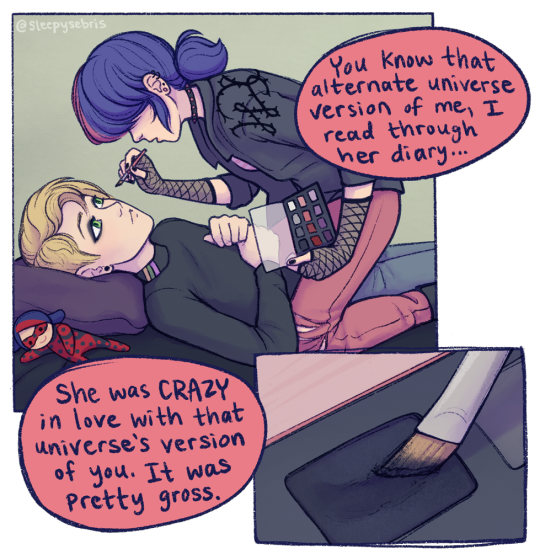

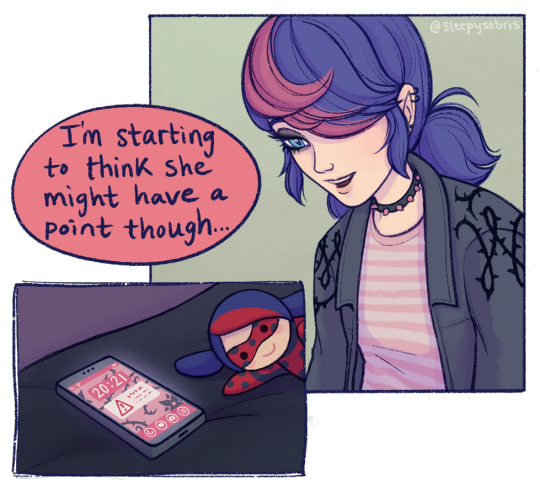
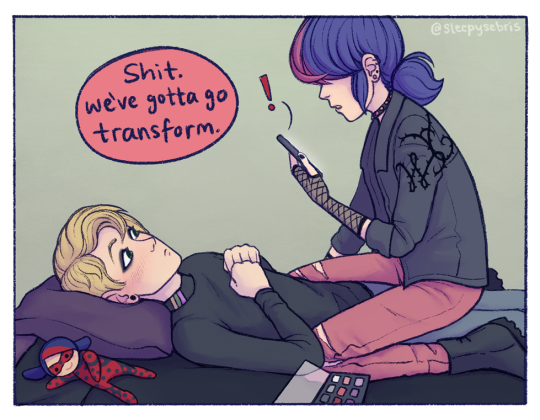
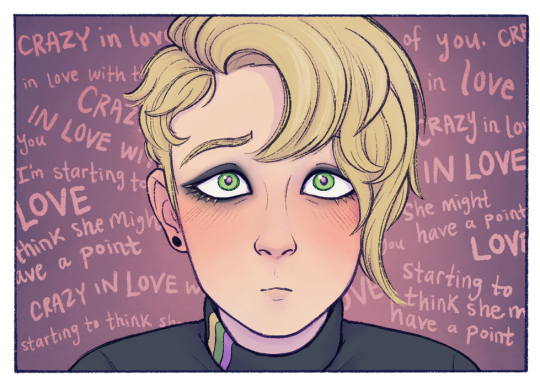

:) 🖤
@mlsecretsanta gift for @thequeenofspace!
happy belated holidays and apologies for the delay, had a serious family emergency followed by sickness! I had so much fun making this though, was so excited to finally draw these two 🖤
hope you enjoy!!!
#i absolutely believe emo marinette went home and made dolls after seeing the ladybug & chat noir dolls#im assuming adrien's room is the preferred hang out space in this universe#so this is his room and that is his ladybug doll#also obsessed with his quiet blushy personality#assume that when they detransform she laughs at his half-finished makeup cause they forgot what they were doing before they left#and he deserves it for poorly-timed teasing her mid-battle or something#there's the fanfic#ml secret santa 2023#ml secret santa#miraculous ladybug#ml paris special#adrienette#emo love square#emodrien#my art#my ml comics
13K notes
·
View notes
Text
What this poll is: A place for you to share why it is, your favorite lovesquare ship is your favorite! To share what exactly about that particular drew you to it (feel free to include in tags what your favorite ship is if you'd like)
What this poll isn't: a place for you to salt on the ships you don't like, or talk about why your favorite is better than others. Please and thank you! 😊
#i feel like there are so many polls about “what” your favorite ls ship is#but i would like to figure out why#we all have different preferences#but what is it about a ship that draws ppl#i have no idea#but i look forward to finding out!#ml lovesquare#ladynoir#marichat#adrinette#ladrien#ladybug#chat noir#adrien agreste#marinette dupain cheng#my polls#miraculous ladybug#ml polls#miraculous#ml#mlb#poll
629 notes
·
View notes
Text
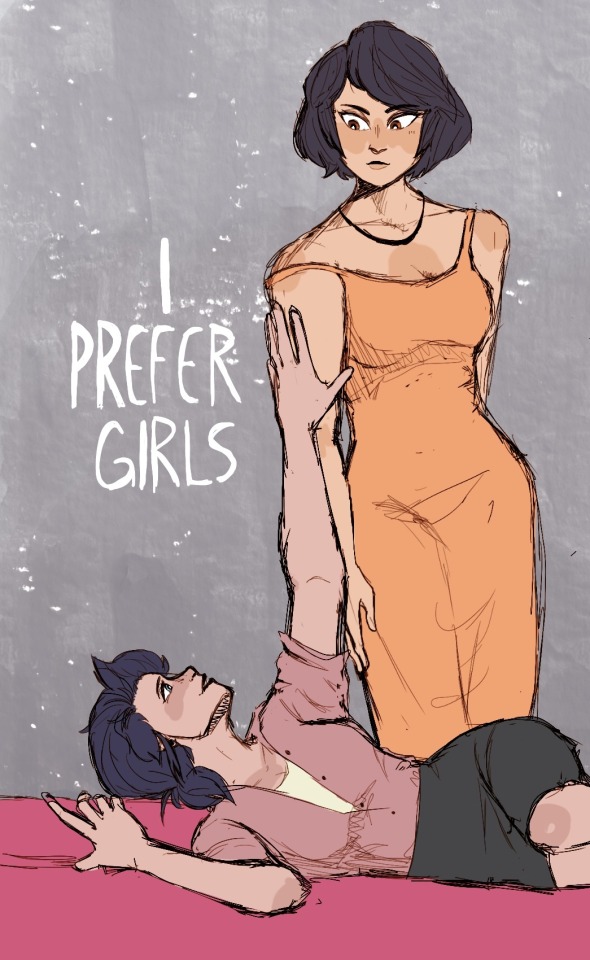
at my core i’m a marigami lover first and foremost
excuse the roughness I was too lazy to fix it up. and i had to redraw it like four times before it looked right
#carpetbug art#miraculous#miraculous ladybug#ml#miraculous fanart#marinette#marinette dupain cheng#kagami#kagami tsurugi#marigami#kagaminette#i thought the og outfits for this drawing meme were so fitting for them so i left those as is#they are my world ❤️#hehehehehe i both love and hate this drawing lmao i fucked a lot up but also i salvaged so much y’all don’t even know#it’s been a rough drawing day#i prefer girls
1K notes
·
View notes
Text

i don't know how zoë managed to top vesperia but hot damn
#miraculous ladybug#ml#zoe lee#kitty noir#kitty noire#i switched her eye and lipstick colors because i prefer the headcanon that all cat holders get green eyes#and warm colors look better on her skin#but people who have issues with any other parts of her outfit are wrong#she is perfect#chloé could never#but man was it hard to get that purple shiny effect on the fabric#ml transmission#transmission spoilers#deflagration spoilers#ml deflagration#my art#fihuli
3K notes
·
View notes
Text
The surprising truth about data-driven dictatorships
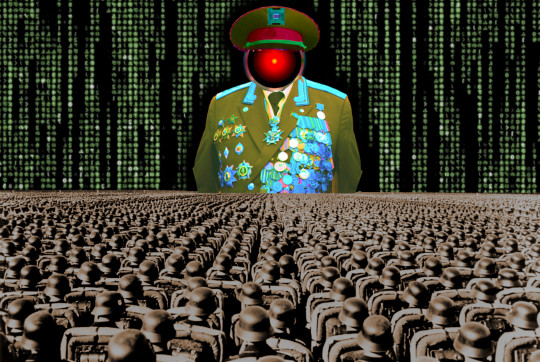
Here’s the “dictator’s dilemma”: they want to block their country’s frustrated elites from mobilizing against them, so they censor public communications; but they also want to know what their people truly believe, so they can head off simmering resentments before they boil over into regime-toppling revolutions.
These two strategies are in tension: the more you censor, the less you know about the true feelings of your citizens and the easier it will be to miss serious problems until they spill over into the streets (think: the fall of the Berlin Wall or Tunisia before the Arab Spring). Dictators try to square this circle with things like private opinion polling or petition systems, but these capture a small slice of the potentially destabiziling moods circulating in the body politic.
Enter AI: back in 2018, Yuval Harari proposed that AI would supercharge dictatorships by mining and summarizing the public mood — as captured on social media — allowing dictators to tack into serious discontent and diffuse it before it erupted into unequenchable wildfire:
https://www.theatlantic.com/magazine/archive/2018/10/yuval-noah-harari-technology-tyranny/568330/
Harari wrote that “the desire to concentrate all information and power in one place may become [dictators] decisive advantage in the 21st century.” But other political scientists sharply disagreed. Last year, Henry Farrell, Jeremy Wallace and Abraham Newman published a thoroughgoing rebuttal to Harari in Foreign Affairs:
https://www.foreignaffairs.com/world/spirals-delusion-artificial-intelligence-decision-making
They argued that — like everyone who gets excited about AI, only to have their hopes dashed — dictators seeking to use AI to understand the public mood would run into serious training data bias problems. After all, people living under dictatorships know that spouting off about their discontent and desire for change is a risky business, so they will self-censor on social media. That’s true even if a person isn’t afraid of retaliation: if you know that using certain words or phrases in a post will get it autoblocked by a censorbot, what’s the point of trying to use those words?
The phrase “Garbage In, Garbage Out” dates back to 1957. That’s how long we’ve known that a computer that operates on bad data will barf up bad conclusions. But this is a very inconvenient truth for AI weirdos: having given up on manually assembling training data based on careful human judgment with multiple review steps, the AI industry “pivoted” to mass ingestion of scraped data from the whole internet.
But adding more unreliable data to an unreliable dataset doesn’t improve its reliability. GIGO is the iron law of computing, and you can’t repeal it by shoveling more garbage into the top of the training funnel:
https://memex.craphound.com/2018/05/29/garbage-in-garbage-out-machine-learning-has-not-repealed-the-iron-law-of-computer-science/
When it comes to “AI” that’s used for decision support — that is, when an algorithm tells humans what to do and they do it — then you get something worse than Garbage In, Garbage Out — you get Garbage In, Garbage Out, Garbage Back In Again. That’s when the AI spits out something wrong, and then another AI sucks up that wrong conclusion and uses it to generate more conclusions.
To see this in action, consider the deeply flawed predictive policing systems that cities around the world rely on. These systems suck up crime data from the cops, then predict where crime is going to be, and send cops to those “hotspots” to do things like throw Black kids up against a wall and make them turn out their pockets, or pull over drivers and search their cars after pretending to have smelled cannabis.
The problem here is that “crime the police detected” isn’t the same as “crime.” You only find crime where you look for it. For example, there are far more incidents of domestic abuse reported in apartment buildings than in fully detached homes. That’s not because apartment dwellers are more likely to be wife-beaters: it’s because domestic abuse is most often reported by a neighbor who hears it through the walls.
So if your cops practice racially biased policing (I know, this is hard to imagine, but stay with me /s), then the crime they detect will already be a function of bias. If you only ever throw Black kids up against a wall and turn out their pockets, then every knife and dime-bag you find in someone’s pockets will come from some Black kid the cops decided to harass.
That’s life without AI. But now let’s throw in predictive policing: feed your “knives found in pockets” data to an algorithm and ask it to predict where there are more knives in pockets, and it will send you back to that Black neighborhood and tell you do throw even more Black kids up against a wall and search their pockets. The more you do this, the more knives you’ll find, and the more you’ll go back and do it again.
This is what Patrick Ball from the Human Rights Data Analysis Group calls “empiricism washing”: take a biased procedure and feed it to an algorithm, and then you get to go and do more biased procedures, and whenever anyone accuses you of bias, you can insist that you’re just following an empirical conclusion of a neutral algorithm, because “math can’t be racist.”
HRDAG has done excellent work on this, finding a natural experiment that makes the problem of GIGOGBI crystal clear. The National Survey On Drug Use and Health produces the gold standard snapshot of drug use in America. Kristian Lum and William Isaac took Oakland’s drug arrest data from 2010 and asked Predpol, a leading predictive policing product, to predict where Oakland’s 2011 drug use would take place.
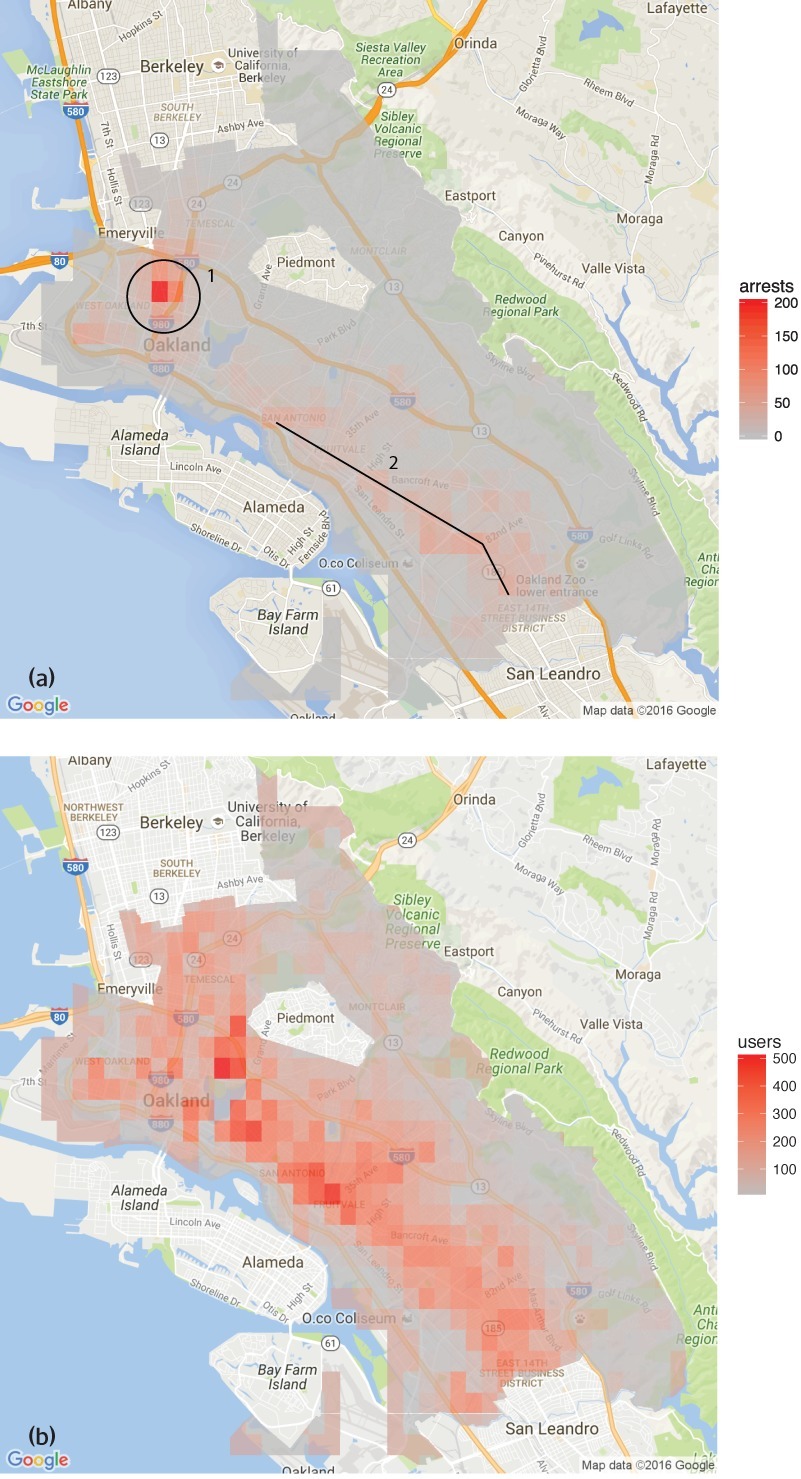
[Image ID: (a) Number of drug arrests made by Oakland police department, 2010. (1) West Oakland, (2) International Boulevard. (b) Estimated number of drug users, based on 2011 National Survey on Drug Use and Health]
Then, they compared those predictions to the outcomes of the 2011 survey, which shows where actual drug use took place. The two maps couldn’t be more different:
https://rss.onlinelibrary.wiley.com/doi/full/10.1111/j.1740-9713.2016.00960.x
Predpol told cops to go and look for drug use in a predominantly Black, working class neighborhood. Meanwhile the NSDUH survey showed the actual drug use took place all over Oakland, with a higher concentration in the Berkeley-neighboring student neighborhood.
What’s even more vivid is what happens when you simulate running Predpol on the new arrest data that would be generated by cops following its recommendations. If the cops went to that Black neighborhood and found more drugs there and told Predpol about it, the recommendation gets stronger and more confident.
In other words, GIGOGBI is a system for concentrating bias. Even trace amounts of bias in the original training data get refined and magnified when they are output though a decision support system that directs humans to go an act on that output. Algorithms are to bias what centrifuges are to radioactive ore: a way to turn minute amounts of bias into pluripotent, indestructible toxic waste.
There’s a great name for an AI that’s trained on an AI’s output, courtesy of Jathan Sadowski: “Habsburg AI.”
And that brings me back to the Dictator’s Dilemma. If your citizens are self-censoring in order to avoid retaliation or algorithmic shadowbanning, then the AI you train on their posts in order to find out what they’re really thinking will steer you in the opposite direction, so you make bad policies that make people angrier and destabilize things more.
Or at least, that was Farrell(et al)’s theory. And for many years, that’s where the debate over AI and dictatorship has stalled: theory vs theory. But now, there’s some empirical data on this, thanks to the “The Digital Dictator’s Dilemma,” a new paper from UCSD PhD candidate Eddie Yang:
https://www.eddieyang.net/research/DDD.pdf
Yang figured out a way to test these dueling hypotheses. He got 10 million Chinese social media posts from the start of the pandemic, before companies like Weibo were required to censor certain pandemic-related posts as politically sensitive. Yang treats these posts as a robust snapshot of public opinion: because there was no censorship of pandemic-related chatter, Chinese users were free to post anything they wanted without having to self-censor for fear of retaliation or deletion.
Next, Yang acquired the censorship model used by a real Chinese social media company to decide which posts should be blocked. Using this, he was able to determine which of the posts in the original set would be censored today in China.
That means that Yang knows that the “real” sentiment in the Chinese social media snapshot is, and what Chinese authorities would believe it to be if Chinese users were self-censoring all the posts that would be flagged by censorware today.
From here, Yang was able to play with the knobs, and determine how “preference-falsification” (when users lie about their feelings) and self-censorship would give a dictatorship a misleading view of public sentiment. What he finds is that the more repressive a regime is — the more people are incentivized to falsify or censor their views — the worse the system gets at uncovering the true public mood.
What’s more, adding additional (bad) data to the system doesn’t fix this “missing data” problem. GIGO remains an iron law of computing in this context, too.
But it gets better (or worse, I guess): Yang models a “crisis” scenario in which users stop self-censoring and start articulating their true views (because they’ve run out of fucks to give). This is the most dangerous moment for a dictator, and depending on the dictatorship handles it, they either get another decade or rule, or they wake up with guillotines on their lawns.
But “crisis” is where AI performs the worst. Trained on the “status quo” data where users are continuously self-censoring and preference-falsifying, AI has no clue how to handle the unvarnished truth. Both its recommendations about what to censor and its summaries of public sentiment are the least accurate when crisis erupts.
But here’s an interesting wrinkle: Yang scraped a bunch of Chinese users’ posts from Twitter — which the Chinese government doesn’t get to censor (yet) or spy on (yet) — and fed them to the model. He hypothesized that when Chinese users post to American social media, they don’t self-censor or preference-falsify, so this data should help the model improve its accuracy.
He was right — the model got significantly better once it ingested data from Twitter than when it was working solely from Weibo posts. And Yang notes that dictatorships all over the world are widely understood to be scraping western/northern social media.
But even though Twitter data improved the model’s accuracy, it was still wildly inaccurate, compared to the same model trained on a full set of un-self-censored, un-falsified data. GIGO is not an option, it’s the law (of computing).
Writing about the study on Crooked Timber, Farrell notes that as the world fills up with “garbage and noise” (he invokes Philip K Dick’s delighted coinage “gubbish”), “approximately correct knowledge becomes the scarce and valuable resource.”
https://crookedtimber.org/2023/07/25/51610/
This “probably approximately correct knowledge” comes from humans, not LLMs or AI, and so “the social applications of machine learning in non-authoritarian societies are just as parasitic on these forms of human knowledge production as authoritarian governments.”

The Clarion Science Fiction and Fantasy Writers’ Workshop summer fundraiser is almost over! I am an alum, instructor and volunteer board member for this nonprofit workshop whose alums include Octavia Butler, Kim Stanley Robinson, Bruce Sterling, Nalo Hopkinson, Kameron Hurley, Nnedi Okorafor, Lucius Shepard, and Ted Chiang! Your donations will help us subsidize tuition for students, making Clarion — and sf/f — more accessible for all kinds of writers.

Libro.fm is the indie-bookstore-friendly, DRM-free audiobook alternative to Audible, the Amazon-owned monopolist that locks every book you buy to Amazon forever. When you buy a book on Libro, they share some of the purchase price with a local indie bookstore of your choosing (Libro is the best partner I have in selling my own DRM-free audiobooks!). As of today, Libro is even better, because it’s available in five new territories and currencies: Canada, the UK, the EU, Australia and New Zealand!

[Image ID: An altered image of the Nuremberg rally, with ranked lines of soldiers facing a towering figure in a many-ribboned soldier's coat. He wears a high-peaked cap with a microchip in place of insignia. His head has been replaced with the menacing red eye of HAL9000 from Stanley Kubrick's '2001: A Space Odyssey.' The sky behind him is filled with a 'code waterfall' from 'The Matrix.']

Image:
Cryteria (modified)
https://commons.wikimedia.org/wiki/File:HAL9000.svg
CC BY 3.0
https://creativecommons.org/licenses/by/3.0/deed.en
—
Raimond Spekking (modified)
https://commons.wikimedia.org/wiki/File:Acer_Extensa_5220_-_Columbia_MB_06236-1N_-_Intel_Celeron_M_530_-_SLA2G_-_in_Socket_479-5029.jpg
CC BY-SA 4.0
https://creativecommons.org/licenses/by-sa/4.0/deed.en
—
Russian Airborne Troops (modified)
https://commons.wikimedia.org/wiki/File:Vladislav_Achalov_at_the_Airborne_Troops_Day_in_Moscow_%E2%80%93_August_2,_2008.jpg
“Soldiers of Russia” Cultural Center (modified)
https://commons.wikimedia.org/wiki/File:Col._Leonid_Khabarov_in_an_everyday_service_uniform.JPG
CC BY-SA 3.0
https://creativecommons.org/licenses/by-sa/3.0/deed.en
#pluralistic#habsburg ai#self censorship#henry farrell#digital dictatorships#machine learning#dictator's dilemma#eddie yang#preference falsification#political science#training bias#scholarship#spirals of delusion#algorithmic bias#ml#Fully automated data driven authoritarianism#authoritarianism#gigo#garbage in garbage out garbage back in#gigogbi#yuval noah harari#gubbish#pkd#philip k dick#phildickian
832 notes
·
View notes
Text

To everyone who's contributed to the Loveybug AU: thank you! It's been wonderful to see everyone's takes on Loveybug and I wanted to pay homage to all the designs that have been created so far:
anna-scribbles
thewanderersminuet (2) (3)
bluebrrytea
heartfulselkie (2)
marichouchou
amandayetagain
bklily
Seeing all of the joy being channeled into your art has been a real treat--there are so many ways that Loveybug can manifest and all are wonderful! Thank you for sharing your vision of her with us!
Tagging: @anna-scribbles, @blur0se, @bluebrrytea, @heartfulselkie, @marichouchou @amandayetagain @bklily @asukiess
#loveybug au#loveybug#catwalker#ml fanart#my art#miraculous ladybug#edit: just replaced the image for this to fix some details i got wrong before#if any of the original artists want me to make more corrections to be more accurate to their designs#(or if you'd prefer that I not copy your design like this)#please let me know and i'll fix that for you!
383 notes
·
View notes
Text
forgot to post shadybug srry yalll 😊😊😊

tbf i already like the canon re-verse designs (even adrien is starting to grow on me) but i felt like making my own vers so … anyways adrien soon i hope. perhaps even scarabella. perhaps lady noire and misterbug.
here r the other marinette sketches (???):
#miraculous#mlb#miraculous ladybug#ladybug#marinette dupain cheng#hui marinette dupain cheng#emo marinette#re-verse marinette#miraculous world#miraculous world paris#shadybug#re-verse ladynoir is so fun i actually prefer it over main universe ladynoir#im sorry shadynoir eats#shadynoir ?? shadyclaw ??#shadynoir#shadyclaw#marigami#lukadrien#toxinelle#ml paris special
55 notes
·
View notes
Text
Miraculous Preference-catching the wedding bouquet
Masterlist
Luka Couffaine

You were standing to the side,watching the bride and groom dance. You weren’t paying much attention to the dance anymore,you were just looking at Luka.
“Is there something wrong?”He looked down at his suit.
“No,you look great” It was the first time you had seen him in a suit,he really did look handsome in it.
“You too”He kissed your forehead. Suddenly he reached his arm in front of you. Looking down you saw that he caught the bouquet.
“You caught it,you know what that means”You teased,he laughed before handing it to you.
Marinette dupain cheng

You were standing off to the side watching as the bride threw the bouquet,Marinette decided to participate. She caught it but backed away too much and lost balance. You quickly ran to catch her before she hit the floor. She stood up straight and looked down at the bouquet.
“I caught it” She mumbled, still looking down.
“And I caught you” Her face was bright red as you kissed her.
Adrien Agreste

The second Adrien caught it everyone gathered around him. He seemed really confused as to why this was happening.
“I don’t get it, what's the big deal?”He asked you.
“It’s just something people say,but if you catch the bouquet it means that you’ll get married next” You laughed and saw him blush.You put your hand on his shoulder and leaned in to whisper “Just so you know,I’d say yes”
Kagami tsurugi

The two of you were heading back to your house when you saw a group of people walk past you. It looked like a wedding,well the end of one. The two of you stopped for a bit to let them walk away,just before they left the bride threw the bouquet. Which Kagami caught,making everyone turn to you and clap. They quickly left,Kagami was looking down at the flowers in her hands. When you turned to look at her,you found her on one knee holding up the bouquet to you.
“Kagami” You took the flowers and leaned down to kiss her forehead. “Thank you”
Zoe lee

“You ready?”
“Yeah,good luck” Both of you were standing,waiting for the bride to toss the bouquet. Out of everyone you caught it. “Congrats Y/N”
“Here,these look better with you” You handed it to Zoe,pulling one out to put in her hair. Before you could react she leaned in and kissed you. She pulled out another flower and put it in your hair.
“They look great on you too”
#miraculous preferences#Miraculous Preference#luka x reader#luka couffaine x reader#marinette x reader#marinette dupain cheng x reader#adrien x reader#adrien agreste x reader#kagami x reader#kagami tsurugi x reader#zoe lee x reader#zoe x reader#miraculous ladybug#miraculous ladybug x reader#ml x reader#mlb x reader#ml imagine#MLB imagine
1K notes
·
View notes
Text

merry christmas again @burntwaffle12 there is another installation to your gift :^)<3
read the first chapter here
read the most recent chapter here
thanks for reading!!<3
#ml#ml fic#miraculous ladybug#miraculous ladybug fic#multimouse#adrinette#now i can actually show you that i was looking at all the things on your list of preferences instead of just au😭😭😭#also surprise ! family bonding is now with the entire town. don’t know how that happened but we’re rolling with it hard
74 notes
·
View notes
Text
The Miraculous Ladybug movie cleansed my face and watered my crops.
#miraculous ladybug#miraculous ladybug movie#miraculous ladybug salt#ml salt#ml writers salt#thomas astruc salt#it wasn't even that good#but Hawkmoth final battle + identity reveal automaticly makes it better than the show#bUt ThE mOvIeS fInAl BaTtLe WaS pReDiCtAbLe!1!#bitch that is not the insult you think it is#I would prefer cartoons that don't melt my brain to a paste#actually
117 notes
·
View notes
Text
Honestly I’m in LOVE with villain mari/shadybugs design


They look so soo Good
#totaly killing the emo look!#I actually prefer emo maris outfit to normal mari#I’m so exited for this special now#miraculous ladybug#ml#miraculous tales of ladybug and cat noir#marinette dupain cheng#shadybug
120 notes
·
View notes
Text
The difference between the shows I post about interchangeably 💀💀💀


#sidrabbles#when i tell you i don't have preferences for any one genre i just know what i DONT like#like music i will listen to anything besides country#hellsing#mlb#ml#miraculous ladybug#i hate male-centric isekai if tht makes sense lol#u will never force me to watch re zero idc how good it is im bye#SAO pass
123 notes
·
View notes
Text
You can say anything, but the Awakening movie shows exactly why Miraculous is a show and not a movie, okay that's all
#it was too accelerated towards the movie#no real connection was made between the characters#sorry i prefer character driven stories rather than plot driven ones#ml awakening spoilers#miraculous posting#jesus christ i hate typos#*towards the end
62 notes
·
View notes
Text
‘ugh marinette shouldn’t have showed mercy and forgiven gabriel he wouldn’t have made the wish otherwise—‘ but that’s in her nature though. she would try and forgive her worst enemy if they wanted to atone and change. take all the people who have hurt her worst in the world, put them in a room, and she would shake all their hands if they said they were terribly sorry and wanted to be better. after all is said and done isn’t that her greatest tragedy? that her heart is so big and so vast that she would risk hurt and pain again and again and again… if it would make the world better. if it would make her loved ones safer. if she could hand out olive branches and not get snapped
#text#miraculous ladybug#mlbposting#ml recreation#recreation spoilers#she thought that gabriel perhaps loved adrien deep down enough to atone#and when he decided he didn’t care to properly right his wrongs#and just wanted to dash into the arms of death#sacrifice was a preferable consequence to him#and all marinette can do is hope and pray that he was riggt#but he isnt#because wishes can never be made#without severe consequences
65 notes
·
View notes
Text
Movie!Marinette: Are you… disappointed it’s me?
Movie!Adrien: A little, yeah.
#ml movie spoilers#ml movie#ml awakening#ml awakening spoilers#miraculous ladybug#I’m sorry I’m so sorry#I think this is true though#is this salt?? I don’t think so?? I loved the movie this was just funny to me#I can tag it as salt to be safe!!#ml movie salt#I suppose#I prefer the show
50 notes
·
View notes